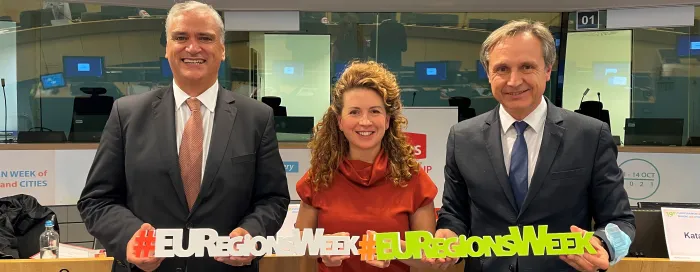Report of our European Week of Regions and Cities workshop
Moderated by former BBC correspondent and communications trainer Claire Doole, the workshop was opened by Christophe Rouillon, President of the PES Group in the European Committee of the Regions and mayor of Coulaines (France). He stressed the need to put the Sustainable Development Goals (SDGs) back on top of the EU's agenda during the recovery. More specifically, he called for better coordination of SDGs in the European Commission’s internal governance, for them to be integrated into the European Semester and for them to be linked to the Recovery and Resilience Facility. Finally, he highlighted the crucial role of local and regional authorities in implementing the SDGs in cities and regions and the importance of strong EU support in terms of financing.
Putting the SDGs at the heart of Europe‘s recovery
Poul Nyrup Rasmussen, former Prime Minister of Denmark, former President of the PES and Co-Chair of the Independent Commission for Sustainable Equality, presented some key findings of the Commission's second report, which will be published at the end of this month. To successfully respond to the challenges ahead, he stressed the need for a new logic of policy-making, based on legally binding obligations at the EU, national, regional and local level. He called for concrete actions, including, an EU poverty law, an EU sustainable guarantee law and an EU biodiversity law. He criticized the current EU top-down approach and emphasised the need to involve local and regional authorities as well as citizens in the transition towards a more sustainable Europe.
"The importance of regions and of the @EU_CoR is a pre-condition of realising the #SDGs in 🇪🇺.
— PES Group Committee of the Regions (@PES_CoR) October 13, 2021
The recipe of growth is not fitting anymore. We see entire regions left behind and exactly those are also hardly hit by climate change."
🗨️ Poul Nyrup Rasmussen #EURegionsWeek pic.twitter.com/965XaTbaLQ
Leading on SDGs in progressive cities and regions in Europe
The panel debate focused on concrete examples of policies and measures to implement the SDGs in progressive cities throughout Europe.
PES Group member Alison Gilliland, Lord mayor of Dublin (Ireland), illustrated how her city focussed on the use of smart technologies and active mobility strategies to resolve environmental challenges and implement the SDGs. She underlined that smart technologies included E-cars, E-bikes or smart bins that reduced waste collection by 85%, thus cutting down on energy and CO2 emissions. She furthermore stressed that active mobility focussed on promoting inclusive cycling and pedestrian areas, for example by building infrastructures to help people with mobility issues. Finally, she also highlighted the importance of public consultations and citizens' involvement in local governance.
Paul Magnette, Mayor of Charleroi (Belgium) and leader of the Belgian Socialist Party (PS), highlighted the need for a fair and inclusive climate transition. He called for social policies aimed at fighting injustices faced by the poorest, that is those who suffer most from the consequences of climate change, but benefit the least from climate transition policies. He also gave three examples of what his own city, Charleroi, is doing to better include citizens in local governance: firstly, promoting inclusiveness through a thematic participation panel; secondly, building permanent dialogue through a territorial participation panel; and thirdly, increasing citizens’ involvement in the city's decision-making process, by replacing once-a-year elected members with citizens in the city council.
PES Group Vice-President and Deputy-Mayor of Budapest (Hungary) Kata Tüttő, explained how her city was taking actions to protect its biodiversity and promote green infrastructures. She stressed that a sustainable energy and climate action plan had to go hand in hand with a strategy for urban green infrastructures and protection of biodiversity in urban areas in order to efficiently deliver on the SDGs. The measures taken in Budapest include, for example, Google cars that provide 3D maps of the city's green infrastructures and which are able to recognise trees, their type and their values. Moreover, she stressed Budapest's position that trees’ values were not determined by their age, but by using more environmentally relevant parameters such as the amount of C02 and dust they absorbed, or how much water evaporated from them. Finally, she underlined that she would advocate women's perspective in the climate debate during her participation at the COP26 in Glasgow.
Concluding the event, Vasco Alves Cordeiro, First Vice-President of the European Committee of the Regions and member of the Azores Regional Parliament (Portugal) underlined the need for closer cooperation between every level of government, from global to local. He underlined the importance of empowering local authorities in the implementation of the SGDs, and of providing them with more financial resources and flexible instruments. He also called for a global societal mobilisation that includes every stakeholder in the process. Finally, he reiterated the need for participatory mechanisms involving citizens in the building of a more sustainable, just and fair Europe.
"The implementation of #SGDs can only happen if we work together from local to global, leaving no people, no places behind.
— PES Group Committee of the Regions (@PES_CoR) October 13, 2021
Covid-19 represents the last warning to all of us. We must act now!"
🗨️ @VascoCordeiro3 #EURegionsWeek pic.twitter.com/EQIkrBGl3L
